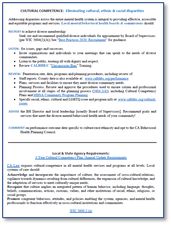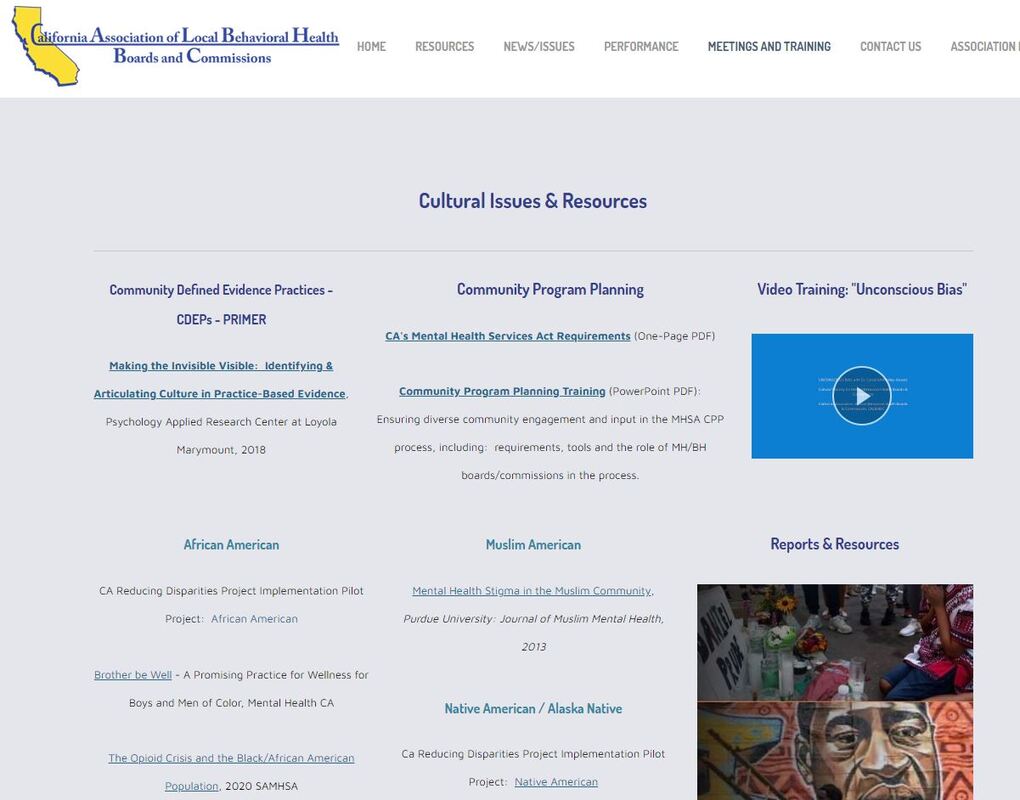Cultural and Linguistic RequirementsDefinitions
|
Guidance for Boards/Commissions |
Resources / ReportsSee: Cultural Issues Page
|
CLAS Standards
The National Standards for Culturally and Linguistically Appropriate Services in Health and Health Care (The National CLAS Standards) aim to improve health care quality and advance health equity by establishing a framework for organizations to serve the nation's increasingly diverse communities.
Principal Standards
1) Provide effective, equitable, understandable and respectful quality care and services that are responsive to diverse cultural health beliefs and practices, preferred languages, health literacy and other communication needs.
Governance, Leadership and Workforce
2) Advance and sustain organizational governance and leadership that promotes CLAS and health equity through policy, practices and allocated resources.
3) Recruit, promote and support a culturally and linguistically diverse governance, leadership and workforce that are responsive to the population in the service area.
4) Educate and train governance, leadership and workforce in culturally and linguistically appropriate policies and practices on an ongoing basis.
Communication and Language Assistance
5) Offer language assistance to individuals who have limited English proficiency and/or other communication needs, at no cost to them, to facilitate timely access to all health care and services.
6) Inform all individuals of the availability of language assistance services clearly and in their preferred language, verbally and in writing.
7) Ensure the competence of individuals providing language assistance, recognizing that the use of untrained individuals and/or minors as interpreters should be avoided.
8) Provide easy-to-understand print and multimedia materials and signage in the languages commonly used by the populations in the service area.
Engagement, Continuous Improvement and Accountability
9) Establish culturally and linguistically appropriate goals, policies and management accountability, and infuse them throughout the organizations’ planning and operations.
10) Conduct ongoing assessments of the organization’s CLAS-related activities and integrate CLAS-related measures into assessment measurement and continuous quality improvement activities.
11) Collect and maintain accurate and reliable demographic data to monitor and evaluate the impact of CLAS on health equity and outcomes and to inform service delivery.
12) Conduct regular assessments of community health assets and needs and use the results to plan and implement services that respond to the cultural and linguistic diversity of populations in the service area.
13) Partner with the community to design, implement and evaluate policies, practices and services to ensure cultural and linguistic appropriateness.
14) Create conflict- and grievance-resolution processes that are culturally and linguistically appropriate to identify, prevent and resolve conflicts or complaints.
15) Communicate the organization’s progress in implementing and sustaining CLAS to all stakeholders, constituents and the general public.
Learn more about implementing The National CLAS Standards within your organization to help advance and sustain culturally and linguistically appropriate services.
Principal Standards
1) Provide effective, equitable, understandable and respectful quality care and services that are responsive to diverse cultural health beliefs and practices, preferred languages, health literacy and other communication needs.
Governance, Leadership and Workforce
2) Advance and sustain organizational governance and leadership that promotes CLAS and health equity through policy, practices and allocated resources.
3) Recruit, promote and support a culturally and linguistically diverse governance, leadership and workforce that are responsive to the population in the service area.
4) Educate and train governance, leadership and workforce in culturally and linguistically appropriate policies and practices on an ongoing basis.
Communication and Language Assistance
5) Offer language assistance to individuals who have limited English proficiency and/or other communication needs, at no cost to them, to facilitate timely access to all health care and services.
6) Inform all individuals of the availability of language assistance services clearly and in their preferred language, verbally and in writing.
7) Ensure the competence of individuals providing language assistance, recognizing that the use of untrained individuals and/or minors as interpreters should be avoided.
8) Provide easy-to-understand print and multimedia materials and signage in the languages commonly used by the populations in the service area.
Engagement, Continuous Improvement and Accountability
9) Establish culturally and linguistically appropriate goals, policies and management accountability, and infuse them throughout the organizations’ planning and operations.
10) Conduct ongoing assessments of the organization’s CLAS-related activities and integrate CLAS-related measures into assessment measurement and continuous quality improvement activities.
11) Collect and maintain accurate and reliable demographic data to monitor and evaluate the impact of CLAS on health equity and outcomes and to inform service delivery.
12) Conduct regular assessments of community health assets and needs and use the results to plan and implement services that respond to the cultural and linguistic diversity of populations in the service area.
13) Partner with the community to design, implement and evaluate policies, practices and services to ensure cultural and linguistic appropriateness.
14) Create conflict- and grievance-resolution processes that are culturally and linguistically appropriate to identify, prevent and resolve conflicts or complaints.
15) Communicate the organization’s progress in implementing and sustaining CLAS to all stakeholders, constituents and the general public.
Learn more about implementing The National CLAS Standards within your organization to help advance and sustain culturally and linguistically appropriate services.


